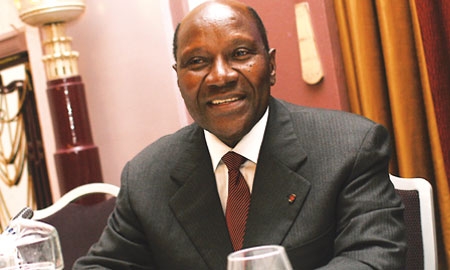Named Prime Minister in November 2012, Daniel Kablan Duncan is a trained economist who has been a leading figure in Ivoirian politics for more than two decades. A fluent English speaker, he is well known by international business communities and is the front man of President Ouattara’s government in numerous road shows and trade visits organised throughout the world. Indeed, also serving the country as Minister of Economy and Finance, he is considered one of the main architects of Côte d’Ivoire’s recent economic boom.
In an exclusive interview with Upper Reach, Mr Kablan Duncan detailed the main objectives of his government.
The UK is one of the key countries targeted by Côte d’Ivoire in its campaign to attract foreign investment. Why are you so interested in attracting British investors?
We have had good relations with the United Kingdom ever since our independence, in the 60s, and the UK is our second largest foreign investor after France. It is an important partner for us. A number of leading British companies are already operating here, in particular in the agro-business, pharmaceutical, banking and energy sectors.
We believe that the private sector should spearhead growth and this is why we are seeking to attract more British companies here, and to see them operate in a wider range of sectors.
What are the key priorities of your government?
The President gave us three priorities: to ensure peace and security, to attain national reconciliation and to rebuild and boost the economy.
Concerning the first objective, the insecurity indicators show that we are close to normalisation.
We have also worked intensely on strengthening international security, which is why President Ouattara visited a dozen Economic Community of West Africa (ECOWAS) member countries soon after taking power. This policy bore fruit, since he was unanimously elected Chair of ECOWAS.
Regarding the objective of national reconciliation, we have put in place the Commission for Dialogue, Truth and Reconciliation, based in part on the example set by Nelson Mandela. Indeed, Archbishop Desmond Tutu came here to exchange on the South African experience. One key point is to listen to victims and to grant them justice. Another key point is that even though there might be an amnesty in some cases, we will not decree a general amnesty.
The third objective is to relaunch the economy. The GDP growth rate dipped by 4.5 per cent in 2011, the year of the end of the crisis, but the following year, the economy bounced back with a 9.8 per cent growth rate. This shows we are on track.
What are the main sectors targeted by the National Development Plan (NDP)?
Our objective is to have 60 per cent of the investments planned in the NDP coming from the private sector, both national and international. For its part, the State will invest in major infrastructure projects in energy, transport, communication and utilities, in partnership with private operators.
Agriculture is obviously a key sector and here again, we are seeking greater involvement of the private sector. We recently adopted the National Programme for Investment in Agriculture, for a total of some $4 billion, of which 60 per cent is set to come from the private sector.
Other key sectors are oil and gas, mines, services, and tourism.
What is the amount of investment needed in infrastructure?
Our development plan for infrastructure for the period 2012-2015 sets an overall investment of CFA76 billion [$158.4 million] coming from both the public and private sectors. The amount of public investment has been set at $8.6 billion. We presented this plan at the consultative group meeting in Paris in December 2012, in which President Ouattara took part, and requested that half of this amount, $4.3 billion, be financed by our development partners. But they found our plan so interesting that they committed to finance $8 billion.
We presented 114 projects, out of which 60 come from the private sector and 54 from the public sector. Concerning the private sector, 80 per cent of the commitments were already engaged. The consultative group was to examine the remaining part. The investment rate has already increased from 7 per cent to 13.6 per cent, and our objective is to reach 23-25 per cent by 2015.
The state for its part invests significantly in roads, motorways, hydroelectric dams such as the Soubré dam, ports and airports.
What is your key message to foreign investors, in particular those from the UK?
Things are moving fast, and we are urging investors to come here without delay because Africa is really the new frontier now. West Africa in particular is a hub of some 300 million inhabitants with a fast-growing economy. I believe that Africa will surprise the world. Côte d'Ivoire will surprise the world, and Africa will follow.

0 COMMENTS